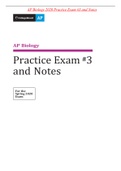Ap biology exam 3 - Study guides, Class notes & Summaries
Looking for the best study guides, study notes and summaries about Ap biology exam 3? On this page you'll find 233 study documents about Ap biology exam 3.
Page 4 out of 233 results
Sort by
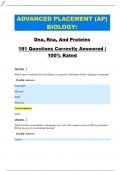
-
ADVANCED PLACEMENT (AP) BIOLOGY: Dna, Rna, And Proteins 181 Questions Correctly Answered | 100% Rated
- Exam (elaborations) • 79 pages • 2023
-
Available in package deal
-
- $12.00
- + learn more
ADVANCED PLACEMENT (AP) BIOLOGY: Dna, Rna, And Proteins 181 Questions Correctly Answered | 100% Rated Which type of mutation does not change an organism's phenotype despite changing its genotype? Possible Answers: Frameshift Missense Silent Nonsense Correct answer: Silent Question 2 What would be an immediate consequence for a cell with a mutant version of DNA polymerase III that has lost its proofreading function? Possible Answers: Cancer EXAM Inability to complete the cell cycle Inabil...
AP Biology 2020 Practice Exam #3 and Notes
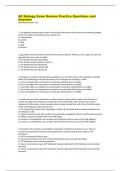
-
AP Biology Exam Review Practice Questions and Answers
- Exam (elaborations) • 42 pages • 2024
- Available in package deal
-
- $14.69
- + learn more
AP Biology Exam Review Practice Questions and Answers DNA/Biochemestry Test -- 1. The digestive enzyme pepsin works in the acidic environment of the stomach to hydrolyze peptide bonds. On which macromolecules does pepsin act? A. carbohydrate B. protein C. DNA D. lipid B. Protein 2. Egg whites consist primarily of water and the protein albumin. When you fry an egg, why does the egg white turn from clear to white? A. The protein becomes dissociated. B. The protein acquires terti...
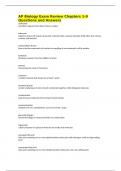
-
AP Biology Exam Review Chapters 1-9 Questions and Answers
- Exam (elaborations) • 8 pages • 2024
- Available in package deal
-
- $10.39
- + learn more
AP Biology Exam Review Chapters 1-9 Questions and Answers prokaryote unicellular organism that doesn't have a nucleus eukaryote organism whose cell contains its genetic material inside a nucleus (includes all life other than viruses, archaea, and bacteria) endosymbiosis theory theory that the eukaryotic cell evolved via engulfing of one prokaryotic cell by another hydrolysis breaking a polymer from the addition of water polymer macromolecule made of monomers monom...
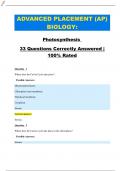
-
ADVANCED PLACEMENT (AP) BIOLOGY: Photosynthesis 33 Questions Correctly Answered | 100% Rated
- Exam (elaborations) • 14 pages • 2023
-
Available in package deal
-
- $9.00
- + learn more
ADVANCED PLACEMENT (AP) BIOLOGY: Photosynthesis 33 Questions Correctly Answered | 100% Rated Where does the Calvin Cycle take place? Possible Answers: Mitochondrial lumen Chloroplast outer membrane Thylakoid membrane Cytoplasm Stroma Correct answer: Stroma Question 2 Where does the Calvin cycle take place in the chloroplasts? Possible Answers: Stroma EXAM Mitochondria Nucleus Thylakoid Correct answer: Stroma Question 3 What is the name of the light-independent reaction of photosynthesis?...
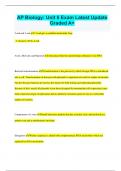
-
AP Biology: Unit 6 Exam Latest Update Graded A+
- Exam (elaborations) • 7 pages • 2024
- Available in package deal
-
- $9.99
- + learn more
AP Biology: Unit 6 Exam Latest Update Graded A+ 5 end and 3 end -5 end gets a modified nucleotide 5cap - 3 end gets a Poly-A-tail Avery, McCarty and Macleod Announced that the transforming substances was DNA Bacterial transformation Transformation is the process by which foreign DNA is introduced into a cell. Transformation of bacteria with plasmids is important not only for studies in bacteria but also because bacteria are used as the means for both storing and replicating plasmi...
![AP Biology [Practice AP Exam] Questions and Answers (Graded A)](/docpics/5221275/663a529b100fd_5221275_121_171.jpeg)
-
AP Biology [Practice AP Exam] Questions and Answers (Graded A)
- Exam (elaborations) • 5 pages • 2024
- Available in package deal
-
- $10.39
- + learn more
AP Biology [Practice AP Exam] Questions and Answers (Graded A) [D] interactions between amino acids present in the polypeptide. [2] The tertiary structure and function of a polypeptide is principally determined by the: ----------------------------------------------- [A] length of the polypeptide. [B] number of nucleotides present in the polypeptide. [C] repeated units of glycerol making up the polypeptide. [D] interactions between amino acids present in the polypeptide. [E] numbe...
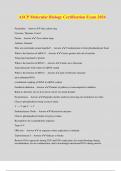
-
ASCP Molecular Biology Certification Exam 2024 100% Correct
- Exam (elaborations) • 34 pages • 2024
- Available in package deal
-
- $13.49
- + learn more
ASCP Molecular Biology Certification Exam 2024 Pyrimidine - Answer ️️ -One carbon ring Cytosine, Thymine, Uracil Purine - Answer ️️ -Two carbon rings Adenine, Guanine How are nucleotides joined together? - Answer ️️ -Condensation to form phosphodiester bond What is the function of mRNA? - Answer ️️ -Carries genetic info out of nucleus Transcript translated to protein What is the function of tRNA? - Answer ️️ -Carries aa to ribosome Anticodon pairs with codon on mRNA ...
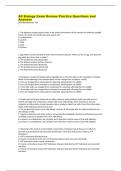
-
AP Biology Exam Review Practice Questions and Answers
- Exam (elaborations) • 42 pages • 2024
-
- $15.59
- + learn more
AP Biology Exam Review Practice Questions and Answers DNA/Biochemestry Test -- 1. The digestive enzyme pepsin works in the acidic environment of the stomach to hydrolyze peptide bonds. On which macromolecules does pepsin act? A. carbohydrate B. protein C. DNA D. lipid B. Protein 2. Egg whites consist primarily of water and the protein albumin. When you fry an egg, why does the egg white turn from clear to white? A. The protein becomes dissociated. B. The protein acquires terti...
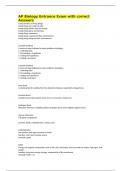
-
AP Biology Entrance Exam with correct Answers
- Exam (elaborations) • 6 pages • 2024
- Available in package deal
-
- $10.39
- + learn more
AP Biology Entrance Exam with correct Answers Characteristics of living things Living things are made of cells. Living things obtain and use energy. Living things grow and develop. Living things reproduce. Living things respond to their environment. Living things adapt to their environment. Scientific Method A series of steps followed to solve problems including... 1. collecting data 2. formulating a hypothesis 3. testing the hypothesis, 4. stating conclusions. Scientific M...

Study stress? For sellers on Stuvia, these are actually golden times. KA-CHING! Earn from your study resources too and start uploading now. Discover all about earning on Stuvia

